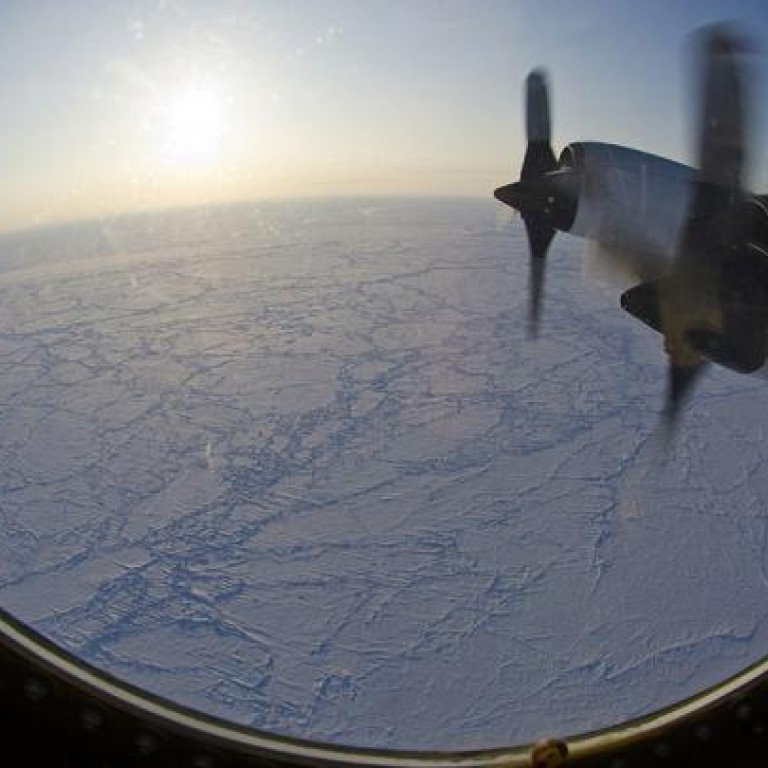
Arctic Sea ice retreats to record minimum as UN climate talks stall
Experts warn of self-perpetuating momentum of warming amid anger over stalled talks on UN accord to combat greenhouse-gas emissions
The fast-changing Arctic broke new records for loss of sea ice and spring snow cover this year, as well as the extent of the summertime melt of the Greenland ice sheet, according to US scientists.
The latest report about the melting Arctic comes as frustrations flared in Doha over slow progress at UN climate talks to reach a global agreement on reducing emissions of greenhouse gases. The build-up of these gases is elevating average global temperatures, with the most pronounced changes in the northernmost latitudes.
"The Arctic is an extremely sensitive part of the world," said Jane Lubchenco, administrator of the National Oceanic and Atmospheric Administration in the United States.
As it warms, she said, "we see the results with less snow and sea ice, greater ice-sheet melt and changing vegetation".
Speaking at the autumn meeting of the American Geophysical Union (AGU) in San Francisco, Lubchenco and other scientists unveiled the annual update of the Arctic Report Card, a collaboration of more than 140 scientists that summarises ways the Arctic continues to grow warmer and greener.
Among this year's findings was that the Arctic Sea ice had retreated to reach a record minimum since scientists began to measure it with satellites in 1979. The ice sheet is about half of what it was in 2000. The loss of sea ice is important to the survival of ring seals, walruses and polar bears, among other animals.
The Greenland ice sheet experienced the most widespread melt on record, covering about 97 per cent of the ice sheet on a single day in July in an event that stunned and alarmed scientists.
The accelerating melt of this vast frozen repository of fresh water is the wild card in scientific projections of how much and how fast sea levels will rise in coming decades.
A new record low for snow cover in the northern hemisphere was set in June. Much of the high-latitude landscape has snow covering it for nine months of the year. Although some years are snowier than others, its overall retreat is altering spring river run-off, growing seasons and the behaviour of wildlife.
With longer growing seasons, the tundra is becoming greener and the underlying permafrost - the frozen soil that traps vast amounts of carbon - is thawing. Shrubs are spreading, as is the frequency of tundra bush fires.
The retreat of snow and ice occurred even though Arctic air temperatures were not unusually high this year compared with the last decade, the scientists said in the report.
This shows the self-perpetuating momentum of warming, they said. As the Arctic loses more highly reflective snow and ice, the warming rays of the sun get absorbed by the darker ground or exposed ocean waters.
"This increases the capacity to store heat within the Arctic system, which enables more melting - a self-reinforcing cycle," said Dr Martin Jeffries, co-editor of the report card and a science adviser to the Office of Naval Research.
Some of those findings have already been made public, reinforcing the already extensive evidence - in real time - of climate change.
New satellite and aerial data presented to the AGU last week suggested that the entire Greenland ice sheet was losing about 22 gigatons of ice a year, with rapid thinning in the northern edge of the ice sheet.
Meanwhile, the UN's weather agency, the World Meteorological Organisation, told negotiators trying to reach a global climate agreement in the Qatari capital that an area of Arctic Sea ice bigger than the entire United States melted this year.
Also, the UN Environmental Programme released a report warning that scientists may have been underestimating the melting of the Arctic. Large-scale thawing of the permafrost may already be under way, releasing more of the gases that cause climate change.
This year is predicted to be one of the warmest on record, with global land and ocean temperatures from January to October about 0.45 degrees Celsius above the average recorded even in the mid-20th century.
The US and Europe baked under heatwaves, the American midwest weathered its worst drought in a generation, and parts of Brazil and China also went without rain. Pakistan lost hundreds to floods caused by epic monsoon rains, while West Africa also experienced floods.
It was the Arctic that exhibited the most staggering changes, though, according to scientists, and the region dominated the UN's annual climate change report.
Los Angeles Times, The Guardian

